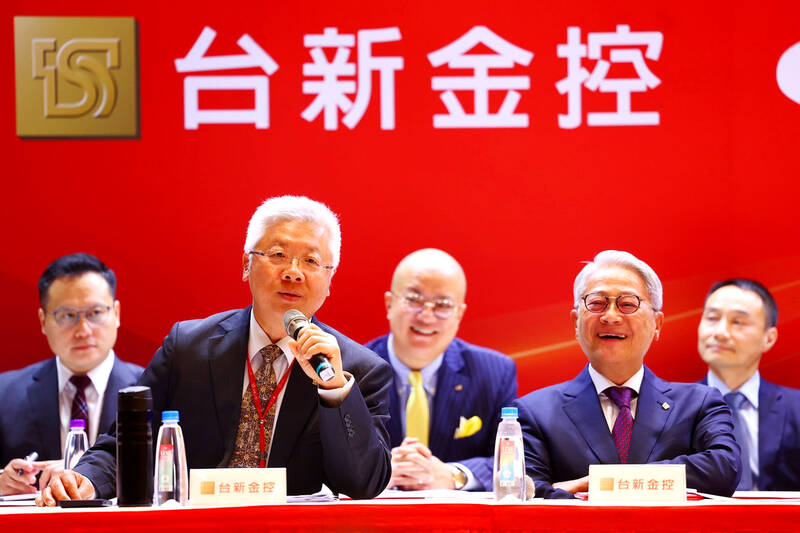The planned merger between Taishin Financial Holding Co (台新金控) and Shin Kong Financial Holding Co (新光金控) might take more than a year to conclude, meriting the removal of the two conglomerates and their subsidiaries from the credit watch list, Taiwan Ratings Corp (中華信評) said on Thursday.
The local arm of S&P Global Ratings placed the life insurance-focused Shin Kong Financial and the bank-oriented Taishin Financial under credit watch on Aug. 27 last year when the two announced the merger plan via share swaps.
“We believe the merger would require more time, giving us more time to assess the rating direction,” Taiwan Ratings credit analyst Eunice Fan (范維華) said.

Photo: CNA
Fan expects a time frame of 12 to 18 months, up from three to six months previously, to evaluate the rating direction of the combined group, and gain a better understanding of the integration and post-merger business and financial plans.
Taiwan Ratings stands by the negative outlook on Taishin Financial and Taishin Life Insurance Co (台新人壽). At the same time, it affirmed its “developing outlook” credit rating on Taishin International Bank (台新銀行).
The merger would soften Taishin Financial’s credit profile, because Shin Kong Financial is weaker financially, but will constitute a significant part of the combined group, Fan said.
The two sides have agreed to name the new entity Taishin-Shin Kong Financial Holding Co (台新新光金控), which would be Taiwan’s fourth-largest financial services provider by assets.
Taishin Financial would need additional resources to manage the integration given the large scale of both groups and the wide variety of units, Fan said, adding that synergy benefits would emerge only after effective integration.
Taishin Financial has delivered stable profitability, while Shin Kong Financial has stayed mostly in the red.
That explained why Taiwan Ratings affirmed its ratings on Shin Kong Financial with a positive outlook on the grounds that Shin Kong Financial’s credit profile would improve after the merger.
The agency also removed Shing Kong Financial, Shin Kong Life Insurance Co (新光人壽), Shin Kong Commercial Bank (新光銀行) and MasterLink Securities Corp (元富證券) from the credit watch list.
The positive outlook reflects Shin Kong Life’s stabilizing financial performance and expected benefits from the merger over the next 12 to 24 months, said Effie Tsai (蔡怡君), another Taiwan Ratings credit analyst.
The insurer posted a profit amid a somewhat favorable capital market last year, reversing losses in the previous two years, Tsai said.
Furthermore, capital increases likely bolstered Shin Kong Life’s risk-based capital ratio from 176 percent in 2023 to 220 percent last year, meeting the minimum requirement of 200 percent, the analyst said.
However, Shin Kong Financial was the only listed financial institute in Taiwan to record a loss last month, with the group pinning the blame on its life insurer.

UNCERTAINTY: Innolux activated a stringent supply chain management mechanism, as it did during the COVID-19 pandemic, to ensure optimal inventory levels for customers Flat-panel display makers AUO Corp (友達) and Innolux Corp (群創) yesterday said that about 12 to 20 percent of their display business is at risk of potential US tariffs and that they would relocate production or shipment destinations to mitigate the levies’ effects. US tariffs would have a direct impact of US$200 million on AUO’s revenue, company chairman Paul Peng (彭雙浪) told reporters on the sidelines of the Touch Taiwan trade show in Taipei yesterday. That would make up about 12 percent of the company’s overall revenue. To cope with the tariff uncertainty, AUO plans to allocate its production to manufacturing facilities in

Taiwan will prioritize the development of silicon photonics by taking advantage of its strength in the semiconductor industry to build another shield to protect the local economy, National Development Council (NDC) Minister Paul Liu (劉鏡清) said yesterday. Speaking at a meeting of the legislature’s Economics Committee, Liu said Taiwan already has the artificial intelligence (AI) industry as a shield, after the semiconductor industry, to safeguard the country, and is looking at new unique fields to build more economic shields. While Taiwan will further strengthen its existing shields, over the longer term, the country is determined to focus on such potential segments as

TAKING STOCK: A Taiwanese cookware firm in Vietnam urged customers to assess inventory or place orders early so shipments can reach the US while tariffs are paused Taiwanese businesses in Vietnam are exploring alternatives after the White House imposed a 46 percent import duty on Vietnamese goods, following US President Donald Trump’s announcement of “reciprocal” tariffs on the US’ trading partners. Lo Shih-liang (羅世良), chairman of Brico Industry Co (裕茂工業), a Taiwanese company that manufactures cast iron cookware and stove components in Vietnam, said that more than 40 percent of his business was tied to the US market, describing the constant US policy shifts as an emotional roller coaster. “I work during the day and stay up all night watching the news. I’ve been following US news until 3am

COLLABORATION: Given Taiwan’s key position in global supply chains, the US firm is discussing strategies with local partners and clients to deal with global uncertainties Advanced Micro Devices Inc (AMD) yesterday said it is meeting with local ecosystem partners, including Taiwan Semiconductor Manufacturing Co (TSMC, 台積電), to discuss strategies, including long-term manufacturing, to navigate uncertainties such as US tariffs, as Taiwan occupies an important position in global supply chains. AMD chief executive officer Lisa Su (蘇姿丰) told reporters that Taiwan is an important part of the chip designer’s ecosystem and she is discussing with partners and customers in Taiwan to forge strong collaborations on different areas during this critical period. AMD has just become the first artificial-intelligence (AI) server chip customer of TSMC to utilize its advanced